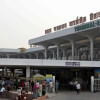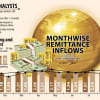Ensure welfare of returnee migrants
Bangladesh should have an effective reintegration programme for the returnee migrants to ensure their social and economic well-being, say migration and development experts.
According to them, a good portion of the migrants face financial, social and psychological problems upon return home due to exploitation and enduring hardship abroad. The returnees continue to suffer from trauma at home.
The observations came at a programme organised to inform the key migration stakeholders about the activities of Prottasha -- a project funded by the European Union and implemented by the International Organisation for Migration in partnership with Brac and the Bangladesh government.
Under the five-year project launched in 2017, 355 returnees from the EU and 372 returnees from Libya, a transit country, are being provided support for psycho-social and economic reintegration.
A foreign ministry official said around one lakh Bangladeshis, who do not have updated documents, live in the EU countries.
According to the Bureau of Manpower Employment and Training, some one crore Bangladeshi expatriates send home about $15 billion a year. However, fraudulence, high migration cost and abuses abroad are some of the common challenges faced by the migrants. Many of them return home empty-handed.
Speaking at the programme at the city’s Radisson Blu Dhaka Water Garden hotel, IOM Bangladesh Chief of Mission Giorgi Gigauri said Prottasha’s goal is to achieve long-term and sustainable development.
He stressed on taking up projects that would benefit the grassroots people and formulating policies based on their needs.
Brac Executive Director Asif Saleh said studies found that one in every three migration attempts fails due to fraudulence. The victims cannot recoup their financial losses.
He said the returnees from the non-EU countries also need help. “We expect our government to take up projects and make it sustainable,” Saleh added.
Brac Migration Programme Head Shariful Hasan said a migrant’s relatives and neighbours support him before migration, but they don’t stand by him after his return.
“The government does not have any effective programme. It should establish a model for the reintegration of the returnee migrants,” he observed.
Foreign Secretary Shahidul Haque said returning home is always a painful issue for a migrant and it has to be dealt with sensitivity. He lauded Prottasha for its good practice.
He said the Global Compact for Migration (GCM) adopted by the UN last year deals with the responsibility and partnership of all countries to ensure migrant rights. Implementation of the GCM is expected to bring partnership into play, the secretary added.
IOM Bangladesh Deputy Chief of Mission Sharon Dimanche called for a greater partnership among the governments, UN agencies, NGOs and private sector to ensure safe migration.
Rensje Teerink, head of the EU delegation to Bangladesh, lauded the project for its achievement and stressed the need for continuing the good work.
Expatriates Welfare Secretary Rownaq Jahan said the government is continuously working to reduce high recruitment cost, cut fraudulence and create awareness among them so that they don’t get into the trap of middlemen and traffickers.
The government has already taken some activities to provide financial help to the affected migrants. Besides, it is working for a comprehensive reintegration programme, she told the programme.

 For all latest news, follow The Daily Star's Google News channel.
For all latest news, follow The Daily Star's Google News channel. 








Comments